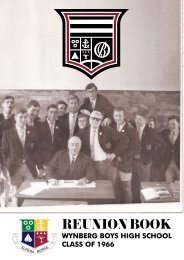WBHS_School_Magazine_1966 LR 01
You also want an ePaper? Increase the reach of your titles
YUMPU automatically turns print PDFs into web optimized ePapers that Google loves.
This was the Society's 23rd Annual Season,<br />
when Mr. Peacock undertook to produce the<br />
Annual High <strong>School</strong> play.<br />
First Function, 18th June<br />
The Hall was well filled on tilis occasion when<br />
a programme, presented entirely by the school,<br />
was given. First, the <strong>School</strong> Orchestra and soloists<br />
gave us the Triumph Dance from Purcell's "Dido<br />
and Aeneas", the first movement from Mozart's<br />
"Adelaide" Concerto for Violin and Orchestrasoloist<br />
Neville Pasvolsky, the Keltic Lament by<br />
Foulds, and a Smetana Polka.<br />
There followed two one-act plays. The first<br />
of these was "The Seventeenth Highwayman", by<br />
Eric Forbes-Boyd, with Norman Coates as Producer,<br />
and a cast including S. Friedlander, P.<br />
Shelton, D. Jupp, M. Stein, P. Dowling and P.<br />
Furman. The plot, concerning an attempt to rob<br />
the Marquis of Tottenham, was well sustained,<br />
and the surprises of bogus characters surprising<br />
us as they should.<br />
The second play, "The Boatswain's Mate," by<br />
W. W. Jacobs, contained only three characters,<br />
taken by H. Bosman, D. Gohl and H. Gohl, with<br />
producer T. Kyriacos. The spirit of this play was<br />
similar to that in the previous one, and it went<br />
quite well.<br />
out. .<br />
J. du Plessis stage-managed through-<br />
At the conclusion, coffee was served, after a '<br />
.pleasant evening's entertainment.<br />
Second Function, 4th, 5th and 6th August<br />
High <strong>School</strong> play, "Court Martial".<br />
Third Function, 19th and 20th August<br />
The "Twelfth Annual Hour of Music," by the<br />
<strong>School</strong> Orchestra, soloists, and Junior Choir in<br />
conjunction with the choir of Notre Dame Convent<br />
took place in the <strong>School</strong> Hall on August 19th<br />
and 20th. The programme on this occasion was<br />
possibly the most ambitious and best balanced<br />
that we have given. The Orchestra, seated this<br />
year in a large semicircle, opened the programme<br />
with the Overture and Triumphing Dance from<br />
Purcell's opera "Dido and Aeneas". The slow<br />
section of the overture drew forth some pleasing<br />
legato playing, while the ensuing quick section<br />
kept a good rhythm, as did the Dance.<br />
Arnon Hurwitz and Mr. A. Lorie then gave us<br />
the first movement of a Mozart Sonata for Violin<br />
and Piano, lively and rhytilrnical. Malcolm Bates<br />
then gave a clean and very competent reading of<br />
the solo part in a Vivaldi Concerto for Cello and<br />
Orchestra, an item that was particularly enjoyable.<br />
Next came Mozart's "Adelaide" Concerto for<br />
Violin and Orchestra, in which the soloist was<br />
Neville Pasvolsky. This is a very beautiful work,<br />
interesting throughout, but dependent upon a<br />
performance with good style and pleasing tone,<br />
and these qualities were evident throughout in<br />
Neville's playing.<br />
The combined choirs, lOO girls and boys, then<br />
assembled to sing us five delightful songs with<br />
piano accompaniment, played, impeccably as<br />
usual, by their director, Mrs. Elsie Jennings. The<br />
songs were "Spring Wind" by Thiman, "Who is<br />
Sylvia?" in the setting by Coates, "The Owl and<br />
the Pussycat" by Rely Hutchinson, the evergreen<br />
"No John" and "Sing, Joyous Bird" by Phillips.<br />
The singing was delightful. and obviously enjoyed<br />
by choir and audience alike.<br />
There followed Haydn's Concertino in C for<br />
Piano and Orchestra, in which the soloist was<br />
Michael Herbert, who gave a thoughtful and controlled<br />
reading of the solo part, for which he<br />
deserves great credit.<br />
The Choir then returned to the platform to<br />
combine with the Orchestra in the singing of<br />
three of the ten Biblical songs, based upon Psalms,<br />
and set to music by Dvorak. First came "Songs<br />
of Gladness", second "Hear, Oh Lord, My Bitter<br />
Cry" and lastly "Oh Sing Unto the Lord a Joyful<br />
Song".<br />
This item created a big impression upon all<br />
present, and set in motion the immediate preparation<br />
of a fourth song in the series, during the<br />
ensuing week. The songs are very beautiful, and<br />
the final one was repeated by general request.<br />
51



